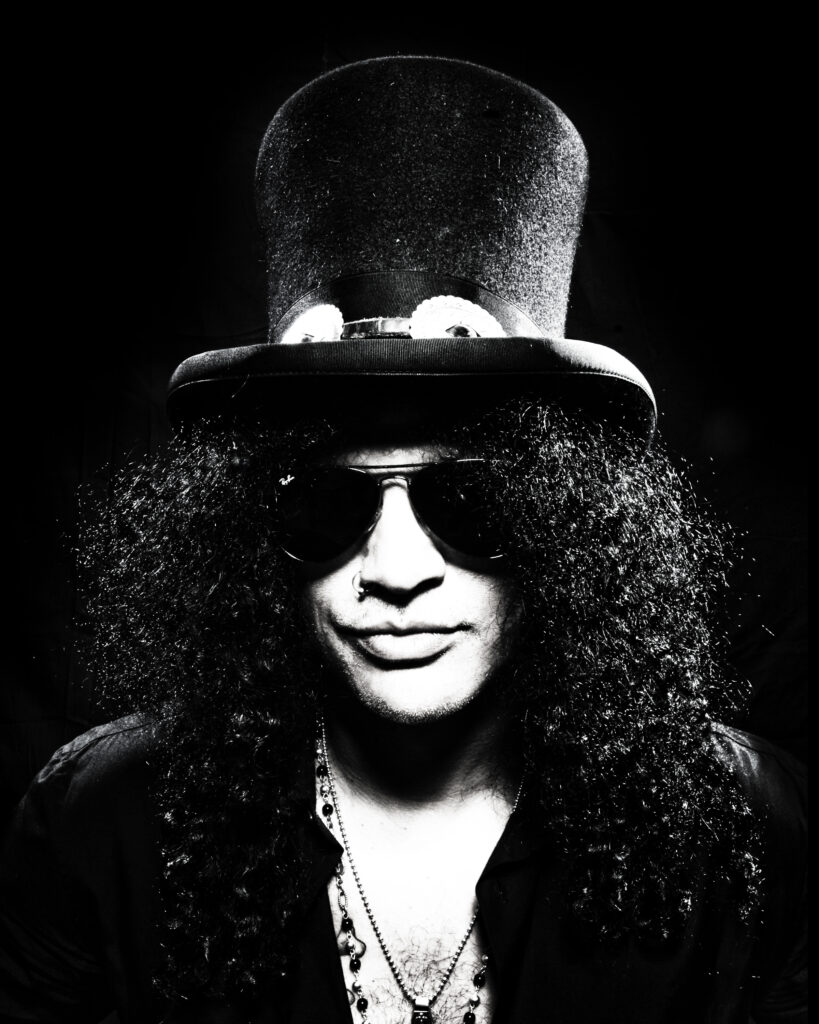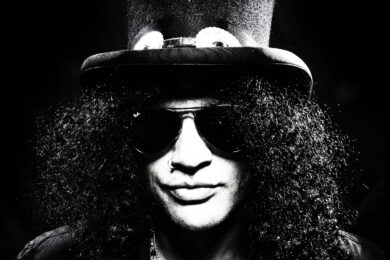By any sensible metric, Saul Hudson has led a charmed life. As part of one of the world’s biggest bands he became an icon in his own right, and has since sessioned with Michael Jackson, Bob Dylan and Ray Charles.
He survived years spent adrift on an ocean of Jack Daniel’s and the farcical gestation of Guns N’Roses’ Chinese Democracy (on which he never eventually appeared) with his reputation more-or-less intact.
While the artistic merits of appearing on American Idol or being immortalised as a computer game character are perhaps open to debate, it seems Slash’s place in rock’s pantheon is very much secure.
When I spoke to him he was affable, enthusiastic and eager to talk about the enduring influence of Jimi Hendrix – an idol of his who was not blessed with such longevity.
You were born in England. Your mum designed costumes for Bowie and your dad designed record covers for people like Neil Young. You’d have been a very small child at the time, but did you ever personally encounter Hendrix?
Slash: I didn’t, but my mom and dad were kind of rock & roll people and my dad especially raised me on British rock music – y’know; The Kinks, Cream, The Yardbirds, The Stones and The Beatles.
So that was just the background of my childhood. I actually didn’t become conscious of Jimi really until I moved to LA and all of a sudden it was Hendrix and The Doors and The Mamas and the Papas, Starship – that whole thing that was going on, and Jimi was just, y’know, he was exciting. He was the embodiment of that wild electric guitarist.
Do you remember when you first listened to him?
S: Not specifically, but at our house in Laurel Canyon that was just something I remember being on the turntable a lot – that first Hendrix Experience record. ‘Purple Haze’ and ‘Light My Fire’ were very much engrained in my memory.
What was it that made him stand out? When I think of guitarists that perhaps have the most audible influence on the way you play I’d have said Page, Perry and maybe some of the UK punk guys. How does Jimi fit in with that?
S: Probably subconsciously, because I ended up becoming a guitar player later on, and looking back at my childhood from when I first picked up the guitar I realise I’ve always been focused on guitar-driven music – I was always waiting for the guitar break.
I think the attraction with Jimi was just that he had this uninhibited, fluid guitar style that basically screamed. It had this over-the-top sound to it that just kind of drew me in. I think all of my favourite guitar players have a sort of manic quality to them.
Any particular favourite recordings?
S: With Jimi, his first two recordings are my favourites. Axis: Bold as Love is my favourite Hendrix album. I’m a ‘Little Wing’ fan. ‘Voodoo Chile’ is great, and his live version of ‘Machine Gun’.
From Live at the Fillmore East?
S: Yeah, Live at the Fillmore… is just unbelievable. I actually didn’t hear that until I was probably about 14 years old.
I wondered about the extent to which you’re interested in the Hendrix myth – the mystique of his persona.
S: I remember when I was a kid, probably about 13 or 14 years old, there was a Hendrix movie that used to play at weekends along with The Song Remains The Same and The Rocky Horror Picture Show and Steve Adler and I used to sneak in on weekends and get stoned and watch those movies.
There’s definitely a fascination with Hendrix’ persona – his demeanour – which seemed very very cool. I don’t think you could get too much cooler than Jimi Hendrix.
When I think about Jimi now I start to relate to what it must have been like to be a rock star in 1967/68. That must have been such a wild time because it was all so new and primitive and everybody was coming from such a different place mentally. There were political things that were having a massive influence on youth culture and the kids trying to take their lives and the future into their own hands.
The great thing about drugs back then to me was that it was something kids were doing because for one it was fun and it was an experience and it was sort of their own, and the fact that the adults hated it and The Man hated it – it didn’t have the kind of taboo it does now, and there was all this experimentation because there was such a movement.
Jimi was at the forefront of that playing what was to become considered later as psychedelic guitar. It just must have been a trip being around then – being a musician and writing and creating records in that whole scene and that’s something that fascinates me about artists of that period.
I was raised into that – I was a result of that culture. Being born in England to an English dad and a black mom is about as 60s as it gets. My grandparents were fucking floored!
Hendrix obviously was American born but first achieved very significant success in the UK. To an extent you’re kind of the opposite, although you didn’t live in England long before moving to the States – do you feel any kind of empathy with Hendrix because of that?
S: For me specifically if it weren’t for the… I’m trying to think of a more subtle way of putting it. I can’t. The crossbreeding thing, if I wasn’t born in the UK and my parents hadn’t come together the way that they had, I wouldn’t be who I am.
I think it’s very important I had that influence growing up in England when I did, and mixing it up and moving over to the States with everything that was going on over here when I did, and it had a huge impact on who I turned out to be.
The thing about Jimi is that he was American born and with a talent from on high, but was discovered by an English crew that brought him over to London where everything was really happening and they appreciated him for what he was.
It’s sort of funny, because you think of all the really amazing rock guitarists that were coming out at that time… basically the English rock guitarists were all a bunch of white kids who wanted to be black and play that kind of guitar, and then there’s this black kid coming from America who kind of brings it part and parcel from over there and everybody just stands back and says ‘wow!’ Everyone was tripping out on Jimi, who’s really the sort of embodiment of that young lead guitar player, using a lot of distortion, a lot of feedback… it must have been interesting being, say, Jeff Beck at the time.
Hendrix’ portrayal as part of that scene, or certainly my perception of it, is that he was an innocent really, swept up in the drugs and hedonism. You, perhaps most especially with Guns N’ Roses, have been portrayed as very much embracing that sort of hedonism. Was it a conscious decision to present yourself that way – or was that just how you were?
S: I didn’t really pay much attention. I just thought we were totally normal. Granted, we had a fair amount of attitude and a certain way of doing things, but we were basically just being ourselves. I guess at that particular point in time there weren’t really that many people – this is in the mid to late 80s – who weren’t really conforming to the status quo. A lot of it was true, but I think they spent a lot of time focusing on that because maybe the media thought it was sellable.
It’s funny because I was born into the drug culture. I’m not gonna speak on behalf of any of the other guys – everyone has different reasons for doing what they do – but for me personally it was nothing to do with the rock stars before me. I hadn’t read it in books. I wasn’t influenced by Sid Vicious, Keith Richards or Jimi Hendrix when it came to drugs and all that kind of shit – that was just part of my natural growing up.
I didn’t find out about a lot of different musicians or entertainers’ specific chemical habits until later on as I went down that road, and then I’d find out that, say, so-and-so was strung out and had serious addiction problems and this, that and the other. It became a sort of support thing – you didn’t feel so guilty for having all these issues because some of your favourite rock stars had the same problems, but it didn’t have an influence on how we came out, or how I came out especially, so all the attention that was given us always seemed a little bit like – I don’t know how to put it – people were shocked by it, which probably shocked us a little bit.
Hendrix started as a session musician, famously playing with Little Richard’s band before being kicked out for upstaging the front man – is there a natural tension that exists between a flamboyant guitarist and a charismatic singer?
S: I think Jimi was probably searching to figure out who he was and taking whatever gigs he could get. He was probably very flamboyant in his mind anyway and just being given the opportunity to be who he wanted to be.
He got that acceptance in London because of that whole sort of psychedelic and hippy trip that was happening there in such a massive way – it just supported that whole thing, which is pretty interesting when you think about it. Given half the chance I’m sure he’d have done it in America, but that spirit just did not exist on a creative level as it did in England.
Obviously Hendrix’ career was cut short and he left only a small body of work – I suppose no one really knows what he was capable of. With Guns you achieved extraordinary success at a very early age and then it looked a bit like you might go the same way as Hendrix, or at least you’ve been portrayed that way. Are you grateful for having made it as far as you have?
S: Well, all things considered, in my case it’s just been sort of dumb luck because any time I’ve ended up in the same kind of physical state Jimi might have been in I managed to come out of it. I’m still here. That’s sort of a freak accident in itself.
Other than that it’s just the passion for playing and the desire to keep making music. I probably have more love for what I do now than I did when I first started so that’s what keeps it going.
Jon Brewer’s documentary Jimi Hendrix: Guitar Hero, narrated by Slash, is out now.



